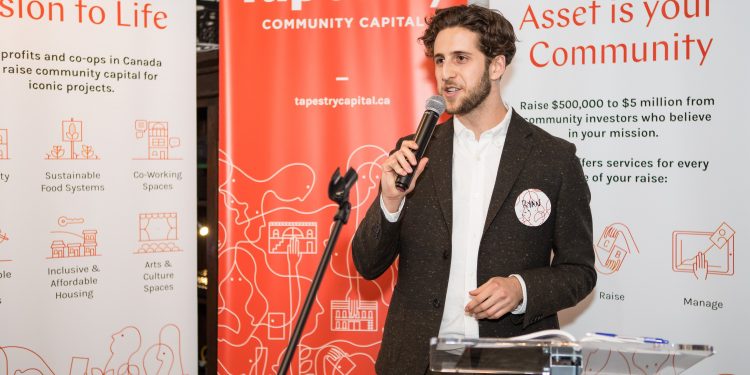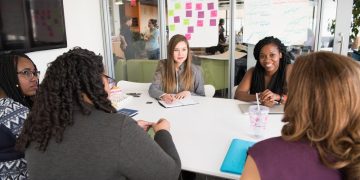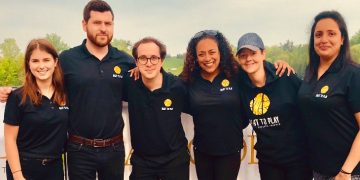The power of community – an interview with Ryan Collins-Swartz, Social Impact Manager
There’s a shift towards more local and sustainable consumer lifestyles and this includes more socially impactful investments. Social enterprises have been faced with funding gaps to realize iconic projects and have had to look to their own communities to raise investment. This trend is one of the reasons why Ryan Collins-Swartz joined the team at Tapestry Community Capital as the Social Impact Manager. Collins-Swartz expresses how community bonds and community investing are a way for people to shape the future of their own communities, while benefitting financially.
What are community bonds?
Community bonds are a powerful tool for non-profits and co-ops to raise financing from their network of supporters. Community bonds are similar to conventional bonds, they are an interest-bearing loan with a face value, fixed terms and interest rate. The difference is that Community Bonds also create a social return in addition to a financial return.
What is an average day of a Social Impact Manager at Tapestry?
I am responsible for the growth of Tapestry Community Capital and servicing our clients. Take last Monday for example:
9:00 AM – I started the day visiting an amazing non-profit, a 25-year-old charity that runs a hub where they run programs for youth at risk of homelessness. After 12 years of leasing and paying rent, they’re exploring how community bonds might help them purchase their current location.
11:00 AM – I walked back to the office and wrote a project brief to the City of Toronto’s Planning Department about a current client’s project.
12:30 PM- I had dumplings with colleague Steph and we reviewed our marketing plan for our current coaching program called Bond Camp, which provides non-profits that are planning a real estate development project with up to $10,000 in funding and coaching to improve their investment readiness. (Applications close November 15!)
1:30 PM – We came back to our office for our weekly management meeting, which is a full team meeting where we discuss our goals and priorities for the week ahead.
3:30 PM – I then jumped on a check-in call with a client where we shared updates and planned for an upcoming workshop.
5:00 PM – I wrapped up the day with all of the important, but easily neglected things like sending emails, checking voicemails, filing expenses, and submitting invoices!
When did you know you wanted to work in social impact?
My father runs his own business in real estate and my mother is a social worker. I like to think that I took the best of both worlds from my parents and started down the path as a social entrepreneur at a young age. Then in business school at Ivey, I started getting deeper into the world of social enterprise. By the time I started working with local nonprofits and working on my own social enterprise, it was already a fait accompli.
What experience is needed to work with community bonds and social enterprise finance?
I’ve found that my experience of being at both sides of the financing table (as the lender and the social entrepreneur) is really valuable when working with community bonds. It’s helpful to be able to understand both mindsets; of the lender potentially investing money who is thinking about risk and return vs. the social entrepreneur who is thinking about growth and scale.
At Tapestry, we walk a tight rope between these two worlds, as we help social enterprises increase their investment readiness to raise funds from community investors, while collaborating with other financial institutions as part of the project financing.
I look back on my non-linear career in business and see how my experiences now empower me to see the full picture of the social finance industry. From working for a Real Estate Investment Trust to working on a tech startup to consulting for small businesses to working on the front lines with non-profits; each gives me a different perspective to successfully support social enterprises in raising community bonds.
What is one important skill to possess for your role?
Asking questions and listening. It’s really tempting when sharing a new idea to always be the one speaking first. Often when I meet with a potential partner or client, they have so many questions about community bonds and Tapestry. I’ve learned that it’s important to pause and ask good questions and wait for the person to fully answer. To me, asking questions and being a good listener is at the core of not only learning about a person and understanding their challenges, but building true relationships.
What advice do you have for a career in social impact?
1. Get out of the building
Impacting society starts with getting off the computer and out into the world with others. Social impact ultimately isn’t done for people, but with people.
2. Don’t wait
Don’t wait to start that cool project you’ve been daydreaming about. Don’t wait to reach out to that person who you admire. Don’t wait to make a change in your life. It’s easy to be caught in a trap of feeling like we’re not ready yet or it’s not good enough to share. “If we wait until we’re ready, we’ll be waiting for the rest of our lives”.
3. Start with you
We can’t possibly change others if we ourselves are not well. Social change starts with taking care of ourselves. Healthy body + healthy mind + healthy relationships = the strong foundation we need to do challenging work.
4. Say yes
To unexpected opportunities, new meetings, volunteering, exchange programs, and ambiguous conferences. All bring new possibilities and new opportunities. One thing always leads to another. Looking back, the unexpected has painted the picture into who I have become.
5. Find your people
Going down an untraditional path can be filled with lots of self-doubt. Finding and befriending others who are doing inspiring work and facing similar challenges was my key to overcoming adversity. Looking back, the people who wanted to support me the most, my parents, couldn’t totally identify with my choices or understand the type of work that I wanted. Meeting other strong peers and mentors (shout-out Studio [Y] Cohort 2, Starting Bloc, and Youthful Cities) gave me faith and helped me tremendously along the way.
Most people don’t know that I…
am passionate about house music, dance music culture, and love to share music as a DJ. Many of my values and characteristics relate back to my experiences on the dance floor. I believe that a lot of lessons and conditions for social change can be derived from a positive, inclusive dance floor.
My experiences get me to where I am today because I…
followed my curiosity, took risks, and met amazing, supportive people at every step of the way.
Curious to learn more? Join the team at Tapestry Community Capital today as the Marketing & Engagement Manager
Want more curated content delivered straight to your inbox?






No Comment